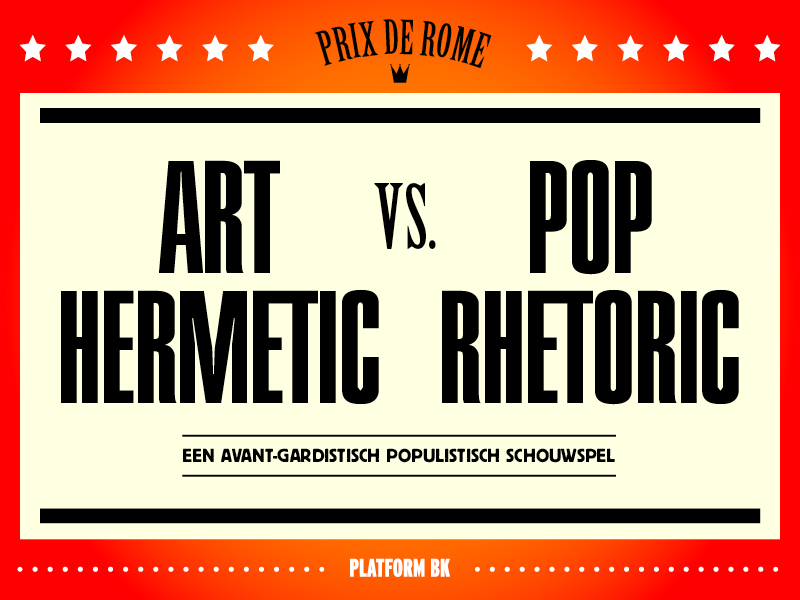Barely two and a half year after the demonstrations on the Malieveld and the broad-based sentiments of indignation and disgust regarding the plans of Halbe Zijlstra, it becomes obvious how the neoliberal rhetoric has infiltrated deeply into the forefront of the cultural sector. To my surprise, in my discussions of late with artists it seems they think they have stood with their backs to the public all these years. Plus I recently read in a mission statement of an artists’ collective that its focus is on ‘proven professionalism’. Last week, as icing on the cake, Queen Maxima was quoted by a reputed art critic in two reviews in the NRC and the Volkskrant about the Prix de Rome, as the measure of evaluation for the exhibition in De Appel. Soon we will be able to read what Henk and Ingrid think about it.
In both texts a polarizing populist argument is utilized in which the peoples’ friend (Maxima) is set opposite the peoples’ enemy (incomprehensible art). Even worse is the suggestion in both articles that the queen will not be able to comprehend the art in question. As the official representative she is portrayed as the voice of the people, who don’t understand that kind of conceptual art. Intellectuality is being put away as something negative, something that differentiates itself from ‘common people’ and is incorrect for that reason.
It is not my objective to criticize the work of a highly valued art critic. But I do want to make a marginal comment on the applied rhetoric, which apparently has become common in the art world as well and is symptomatic for a worrying pervasive mindset in which market value and the serving of ‘the people’ lead the way.
Very telling are the last two sentences in the article in the Volkskrant: ‘ does this sectarian party serve the importance of contemporary art? Or does it only widen the gap with the public? In other words: the importance of art is being equated to the rapprochement with the public.
In the past, it was widely acknowledged that the art world was at society’s forefront. There was even a time when all eyes were set on The Netherlands and the Stedelijk Museum in Amsterdam as a progressive role model. These times seem to be very far behind us now, which makes the appearance of populist rhetoric in a report on the Prix de Rome even more painful – a prize that aims to boost the development of young visual artists. Current politics regard this type of development as an individual responsibility. This view is at the heart of the substantial cutbacks that post academic art schools are facing and that continue to threaten their future. It’s a position that makes it even more important for a prize such as the Prix de Rome to (continue) existing and it is in fact crucial that participants have not produced works that prioritize public acclaim or market potential. They don’t seem to have given in to the pressure of The Hague. Hermetic or not, the Prix de Rome is one of the only places left where artists can appropriate a conceptual area of freedom and stand a chance to affect society’s forefront (again), even if society will not instantly recognize itself in it.
The rhetoric at play here is spreading and indicates a turning point in the discourse within the cultural sector, in which art is expected to serve a political agenda which we were fighting against not so very long ago. By eagerly wanting to fulfil new criteria regarding audience numbers and entrepreneurship, we’ve lost sight of art’s fundamental values and needs. And once the autonomous position of the arts in society will have evaporated, due to the continuous repetition of qualifications such as “hermetic” and “distant”, politicians will not have to worry about future austerity rounds being disturbed by screaming masses on the Malieveld, for there won’t be much left to defend.
Whoever may win the Prix de Rome this year, for heaven’s sake let’s think for ourselves in the arts field; let us define our own values and pathways, aspiring to a future where politics looks at the arts for new ideas, and not always the other way around.
Irene de Craen (1980) is a freelance writer, curator and lecturer at the Gerrit Rietveld Academie.
More Populist Than Ever

04/11/2013